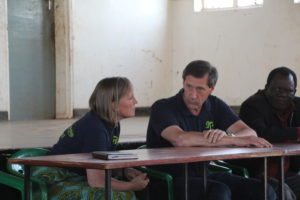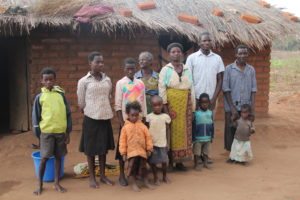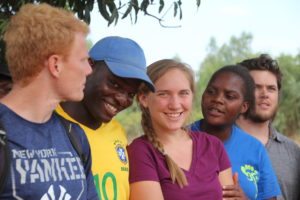 On Thursday morning Liz, Stephen and I headed to Liti village for a meeting while Terra and Jordan went down in the villages to reconnect with old friends. The meeting was held in what was by far the largest building I had seen in the villages of Sakata. Built in the 90’s by another NGO, the town hall like structure is the sight of many important meetings and events in our catchment area. Today we would be meeting with the all of the chiefs from the 26 villages that we worked with, as well as the Sub Traditional Authority, a man of some importance in the Zomba region, who oversaw all of the chiefs and village headman in that area. The meeting consisted of technical matters (that I won’t bore you with) and lasted for over 4 hours because of the long and detailed questions asked by the chiefs and the Sub TA. While this tested the limits of my attention span (especially because I was merely an observer and large parts of the meeting were conducted in Chichewa) I was told afterwards by our Malwian staff how positive the intensive questioning had been. Not long ago the chiefs would have sat there silently, agreeing to whatever the wealthy Azungu proposed, not feeling confident enough to engage VIP in a healthy and constructive debate. Their questions and follow up questions were a sign that the VIP approach and emphasis on community empowerment is working. The chiefs and Sub TA and the communities they represent now feel like equal partners with VIP and are no longer content to remain passive actors. They were actively engaged in every question that was raised and every decision that was reached. It was a truly encouraging sign of a community that was determined to develop itself.
On Thursday morning Liz, Stephen and I headed to Liti village for a meeting while Terra and Jordan went down in the villages to reconnect with old friends. The meeting was held in what was by far the largest building I had seen in the villages of Sakata. Built in the 90’s by another NGO, the town hall like structure is the sight of many important meetings and events in our catchment area. Today we would be meeting with the all of the chiefs from the 26 villages that we worked with, as well as the Sub Traditional Authority, a man of some importance in the Zomba region, who oversaw all of the chiefs and village headman in that area. The meeting consisted of technical matters (that I won’t bore you with) and lasted for over 4 hours because of the long and detailed questions asked by the chiefs and the Sub TA. While this tested the limits of my attention span (especially because I was merely an observer and large parts of the meeting were conducted in Chichewa) I was told afterwards by our Malwian staff how positive the intensive questioning had been. Not long ago the chiefs would have sat there silently, agreeing to whatever the wealthy Azungu proposed, not feeling confident enough to engage VIP in a healthy and constructive debate. Their questions and follow up questions were a sign that the VIP approach and emphasis on community empowerment is working. The chiefs and Sub TA and the communities they represent now feel like equal partners with VIP and are no longer content to remain passive actors. They were actively engaged in every question that was raised and every decision that was reached. It was a truly encouraging sign of a community that was determined to develop itself.
Following the meeting we contacted the girls and arranged to pick them up at our friend Sydney Chikilema’s house. Even before I met Sydney, I had known that he had grown up, and was still living in, extreme poverty. Before coming to Malawi, Liz had told me his story in bits and pieces and I knew that even by Malawian standards, his family was poor. But nothing prepared me for what I found when we arrived at Syndey’s home. We pulled off the main dirt road that winds through the trading center that has grown up around the VIP Maize Mill in Kalupe village onto a much smaller road that cuts between two fields. Eventually the road disappears into an uneven path and we stopped the Landcruiser just as Sydney appeared around the corner of the path. We hopped out of the truck and greeted him warmly, asking him how the day had gone teaching with Trudi at Sakata School. As we followed him down the path his family compound came into sight. Directly across from us stood a completed brick building with a thatched roof and cloth doorway. At right angles to the finished building sat two partially completed brick structures facing each other across a courtyard created by the spacing of the buildings. Sydney’s house, to my right, had an iron sheet roof thanks to VIP, but was still many weeks from being able to house anyone. The house across from it did not yet have a roof and the entire time we sat in the courtyard with Sydney, a child sat there dully and motionless, watching us without making a sound. We soon learned from Sydney, who greeted us with a smile, that the compound housed ten people, all of whom must have lived in that one dilapidated brick building, which was roughly the size of my family’s living room.
Directly across from us stood a completed brick building with a thatched roof and cloth doorway. At right angles to the finished building sat two partially completed brick structures facing each other across a courtyard created by the spacing of the buildings. Sydney’s house, to my right, had an iron sheet roof thanks to VIP, but was still many weeks from being able to house anyone. The house across from it did not yet have a roof and the entire time we sat in the courtyard with Sydney, a child sat there dully and motionless, watching us without making a sound. We soon learned from Sydney, who greeted us with a smile, that the compound housed ten people, all of whom must have lived in that one dilapidated brick building, which was roughly the size of my family’s living room.
It was hard to imagine anyone growing up like that, but it was so much harder to know that a friend of mine had grown up in these conditions and, despite the nice clothes that he wore thanks to VIP which would have concealed the fact from a casual observer, that he still lived here. As we joined Terra, Jordan, Trudi, Isaac Mwalabu and Violet (another VIP translator and friend of the two Heinzel-Nelson girls) who were sitting on a plastic sheet in the courtyard, my eyes continuously glanced back to Sydney’s two young cousins who sat on the ground next to their mother eating raw cassava root. I could not tell by looking at them how old they were. By their size I would have guessed they were three or four, but their faces were already stretched and thin from too many burdens. I have never seen children like them. Children who showed no emotion, no reaction to anything going on around them. I would wave and smile at them and they continued to stare blankly ahead. As we talked with Sydney’s family we learned that this year (with Sydney away at secondary school, trying to build a future) his family had only harvested two bags of maize from their field. With the next harvest over 8 months away the food was already almost exhausted. They would be dependent on ganyu (piece work) in other people’s fields and finding odd jobs to scrape enough kwacha together to buy dinner every night. I knew then that when I looked at Sydney’s cousins I was looking at the faces of malnutrition. These young girls were now permanently scarred by the struggles they had gone through in their earliest days. Their bodies had been starved of nutrients and they hadn’t developed properly. It was hard to think, and even harder to write (as if my acknowledgement of it somehow made it more final) but I knew then that these girls would never reach their full potential. They would always be stunted.
I couldn’t stop thinking how unfair it was that these girls had lost their future when they were barely old enough to walk. In a world of such plenty, where people in my country die from having too much food, these girls had been robbed of a future because they had been denied even the bare minimum necessary for a human being. If people could only see Sydney’s family in person and understand what true abject poverty was, and how destructive of human life it could be, we would solve the problem of extreme poverty within a few years. But people like Sydney’s cousins remain in the shadows, off to the side, down a dirt road where even well intentioned westerners rarely go. From time to time they appear as pictures accompanying a plea for donations to some organization or charitable event, but for the vast majority of their lives they are forgotten people.
I am no expert on childhood development and I hope I am wrong, but I didn’t think that I could do anything for Sydney’s cousins. But I know that I can still do something for Sydney. Somehow, against all logic, despite every odd stacked against him he had seized upon a chance to escape the life that chance or cruel fate had forced him into. He had been, in his own words, “rescued from the mud” by VIP. As I sat in his courtyard, I was more amazed then ever by Sydney. Not only was I amazed at how he had pulled himself out of this mind numbing poverty to learn English, get accepted into an excellent secondary school and find himself poised on the verge of being accepted into university. I was amazed that he was able to smile and laugh. That he was able to keep moving forward every day when he has so much pulling him back. I was not sure what I expected to find when I came to Malawi, or what I was hoping to accomplish. But I left Sydney’s house with a more complete understanding of the indomitable nature of the human spirit and the most sincere drive to ensure that people like Sydney and his family are no longer forgotten.
Not only was I amazed at how he had pulled himself out of this mind numbing poverty to learn English, get accepted into an excellent secondary school and find himself poised on the verge of being accepted into university. I was amazed that he was able to smile and laugh. That he was able to keep moving forward every day when he has so much pulling him back. I was not sure what I expected to find when I came to Malawi, or what I was hoping to accomplish. But I left Sydney’s house with a more complete understanding of the indomitable nature of the human spirit and the most sincere drive to ensure that people like Sydney and his family are no longer forgotten.


There must be a term for it, but you now understand the true meaning and impact of abject poverty. Sydney’s story is an amazing one, one that provides hope for him as well as others that VIP may touch.
thank you so much Justin for these stories from your heart. i read this and re read it and makes me think how ungrateful we are for all that we have and i am going to try my best to do better and how happy they are with so little. we need to take lessons from them for sure. thanks again.
Great writing Justin…you really captured the heartbreaking poverty!!!!!
Looking forward to hearing how you coped…..a little of my heart has been with you.
Thank you for your story.